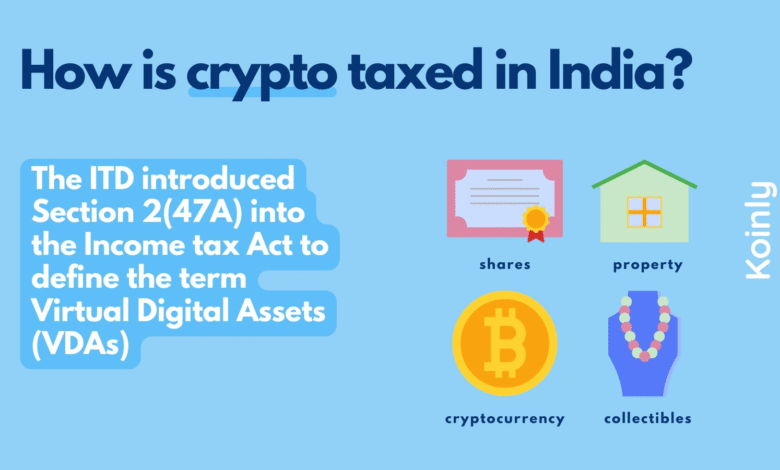India Crypto Tax: Government Enhances Compliance Measures

India crypto tax measures have gained significant attention as the government ramps up efforts to regulate the burgeoning digital asset landscape. Following the implementation of taxes on virtual digital assets (VDAs) in fiscal year 2022-23, the Indian government collected approximately ₹269.09 crore (around $32 million) in the first year, showcasing a robust framework for cryptocurrency tax India. As these regulations evolve, compliance with crypto taxation has become paramount for investors and virtual asset service providers alike. The adherence to VDA tax regulations not only ensures transparency but also supports revenue collection in a previously unregulated market. With GST on crypto services being introduced, the framework aims to provide clarity and robust enforcement in this expanding field.
The recent developments in India’s taxation of virtual currencies highlight a critical shift in how digital wealth is monitored and taxed. The government’s focus on cryptocurrency tax compliance illustrates its commitment to establishing a structured approach to managing gains from digital assets. As various regulations unfold, the implementation of taxes on these financial instruments will shape the landscape for investors and exchange platforms. The introduction of a Goods and Services Tax (GST) on services related to cryptocurrencies paves the way for further integration of digital assets within the formal economy. Overall, this regulatory evolution aims to create a fair and accountable ecosystem for digital asset transactions in India.
Understanding Cryptocurrency Tax Regulations in India
India’s approach to cryptocurrency tax regulations is becoming increasingly structured as the government seeks to strengthen compliance. Under section 115BBH of the Income Tax Act, a flat income tax of 30% is imposed on gains from the transfer of virtual digital assets (VDAs). This stringent taxation policy means that individuals and entities engaging in cryptocurrency transactions must diligently keep track of their income and report it accurately to avoid penalties. The framework also simplifies tax compliance for taxpayers but raises concerns regarding the implications for the crypto market’s growth in India.
In addition to income tax, the government has instituted a 1% Tax Deducted at Source (TDS) on VDA transfers that exceed specified thresholds. This mechanism serves to monitor transactions more effectively and prevent tax evasion. By incorporating these regulations into the broader tax system, the Indian government aims to create a transparent and accountable environment for cryptocurrency trading, which is crucial given the rising popularity and trading volumes in digital assets.
The Role of Compliance in India’s Crypto Taxation
Compliance is at the heart of India’s cryptocurrency tax efforts, as the government employs advanced data analytics tools to detect tax evasion effectively. Recent statements from Pankaj Chaudhary, Minister of State for Finance, highlight the utilization of sophisticated surveillance systems, including the Non-Filer Monitoring System, to trace incomes that might not be reported correctly. These measures are designed not only to increase tax collection but to deter the under-reporting of crypto income significantly.
The outreach initiatives under the NUDGE program aim to identify discrepancies exceeding ₹1 lakh, prompting taxpayers to correct their filings voluntarily. This proactive approach demonstrates the Indian government’s commitment to ensuring rigorous compliance with VDA tax regulations. It fosters an environment where taxpayers are encouraged to adhere to legal obligations, thus enhancing overall trust in the regulatory framework governing cryptocurrencies.
Implications of the 30% Cryptocurrency Tax in India
The imposition of a flat 30% tax on profits from cryptocurrency transactions has significant implications for individual traders and businesses alike. This level of taxation, without allowances for deductions (except for acquisition costs), raises concerns about the viability of crypto investments in India. Investors must understand that while the potential for returns exists, the high tax burden can eat into profits substantially, influencing decision-making in terms of when and how to trade virtual assets.
Moreover, with the global trend towards more favorable crypto taxation in some jurisdictions, there is a risk that India may see a capital flight as investors choose to relocate their digital asset investments in countries with tax structures perceived as more supportive. This could stifle innovation and growth in the Indian crypto sector, making it imperative for the government to consider balancing revenue needs with fostering a competitive environment for digital asset investments.
GST on Crypto Services: An Overview
The introduction of an 18% Goods and Services Tax (GST) on service fees by crypto exchanges, such as Bybit, has further complicated the financial landscape for cryptocurrency users in India. This tax is levied on any services provided to Indian residents, thus significantly increasing the costs associated with trading and transacting in cryptocurrencies. As exchanges conform to these tax regulations, traders must now account for GST in addition to other taxes, shaping their overall investment strategies.
For many users, the incorporation of GST could act as a double-edged sword—while it legitimizes crypto services, it also adds a layer of financial burden that could deter new investors. In a market that thrives on accessibility and ease of entry, this change might provoke skepticism and push some users towards decentralized finance (DeFi) platforms that operate outside traditional regulatory frameworks. As the landscape continues to evolve, understanding the implications of GST on crypto services is pivotal for both investors and service providers.
Enhancing Training for Crypto Transaction Monitoring
The Indian government’s commitment to strengthening enforcement capabilities for taxation compliance is evident in their emphasis on training personnel responsible for monitoring VDA transactions. Various capacity-building initiatives are underway, aimed at equipping enforcement officers with the necessary skills to handle cryptocurrency-specific cases effectively. The preparation of professionals through structured workshops and specialized training reflects a proactive stance towards the complexities of digital asset regulation.
Furthermore, collaboration with institutions like the National Forensic Science University underlines the seriousness of India’s approach to digital asset oversight. Short-term courses in digital forensics are enabling officers to gain expertise in the unique challenges posed by blockchain analysis and the legal frameworks surrounding cryptocurrencies. This comprehensive educational strategy is essential for tackling the fast-evolving crypto landscape, ensuring that the government can adeptly manage compliance monitoring and investigation of VDA-related transactions.
Navigating Digital Asset Tax India: Compliance Challenges
Navigating the complexities of digital asset tax in India presents significant challenges for many taxpayers. As the market for cryptocurrencies expands, so does the ambiguity surrounding compliance, particularly with evolving regulations and reporting requirements. Investors must stay informed about the latest tax obligations, including the flat 30% income tax and TDS implications, to avoid potential penalties for non-compliance. This need for awareness increases the burden on traders, especially those new to the crypto space.
The rapid adaptation required by taxpayers can lead to misunderstandings about their roles under the current regulations. Those engaging in crypto transactions need to develop a firm grasp of both ongoing tax updates and compliance documentation processes. As the framework continues to adapt, ensuring clear communication from the government will be essential in assisting taxpayers in adhering to their obligations without confusion or hardship.
Future of Cryptocurrency Taxation in India
The future of cryptocurrency taxation in India is poised for further development as the government seeks to refine its approach in response to market dynamics and stakeholder feedback. With continuous advancements in technology and trends in digital asset trading, Indian authorities will likely revisit tax policies to balance revenue generation with fostering an innovative environment. The evolving landscape of cryptocurrencies may compel the government to consider more adaptive, flexible regulatory frameworks that encourage responsible trading while ensuring compliance.
Moreover, as India positions itself as a key player in the global digital economy, it will need to ensure its taxation policies remain competitive compared to other nations. A forward-thinking approach to regulating and taxing cryptocurrencies can attract global investors and innovative startups, fueling growth within the sector while simultaneously safeguarding consumer interests. Future policy decisions will play a critical role in shaping the trajectory of cryptocurrency in India.
Collaborative Efforts for Better Crypto Tax Compliance
Collaborative efforts between the government and cryptocurrency platforms are crucial in enhancing tax compliance and ensuring a smoother integration of cryptography into the Indian economy. By working together, these stakeholders can develop systems that simplify the tax reporting process for users while ensuring that the government receives accurate data on VDA transactions. Such collaboration can pave the way for clear guidelines that would alleviate the concerns surrounding compliance risks and uncertainties.
As seen in the case of stringent monitoring through tools like the Non-Filer Monitoring System, cooperation can lead to more informed strategies that ultimately benefit both the state and taxpayers. Creating a transparent communication channel where crypto service providers educate users about their tax obligations can empower investors and support the country’s goal of maximizing tax revenue from this burgeoning sector.
Taxation and the Growth of Virtual Digital Assets in India
The taxation of virtual digital assets (VDAs) is fundamentally intertwined with the growth trajectory of cryptocurrencies in India. As regulatory frameworks grow more defined, investors may feel more secure in entering the market, which is essential for driving adoption and innovation. However, stringent taxation policies coupled with high rates may deter engagement, emphasizing the need for a balanced approach that promotes growth while ensuring compliance.
For VDA markets to flourish, the government must find a way to incentivize investment while maintaining a robust system for tax revenue collection. It may involve reassessing the current tax structures to make them more favorable for long-term investors and encouraging innovation within the digital asset ecosystem. Ultimately, the ability to harmonize regulatory requirements with a pro-growth agenda will dictate the future landscape of cryptocurrencies in India.
Frequently Asked Questions
What are the current cryptocurrency tax regulations in India?
In India, cryptocurrency tax regulations stipulate a flat 30% income tax on gains from the transfer of virtual digital assets (VDAs), as per section 115BBH of the Income Tax Act. Additionally, there is a 1% Tax Deducted at Source (TDS) on VDA transactions above specified thresholds, ensuring better tracking of crypto taxation compliance.
How does GST apply to crypto services in India?
In India, the Goods and Services Tax (GST) applies to crypto services. For instance, cryptocurrency exchange Bybit has announced an 18% GST on service fees for Indian users. These measures are in line with Indian laws that require GST to be levied on services provided to residents, contributing to the overall digital asset tax India framework.
What steps is the Indian government taking to improve crypto taxation compliance?
The Indian government is enhancing crypto taxation compliance through advanced data analytics tools to monitor and detect tax evasion in VDA transactions. Initiatives like the Non-Filer Monitoring System (NMS) and outreach via the NUDGE initiative aim to correct discrepancies in reported crypto income.
What challenges exist in reporting cryptocurrency income in India?
Challenges in reporting cryptocurrency income in India include the potential for under-reporting or misreporting due to complex regulations. The lack of a centralized system for real-time matching of income tax returns and TDS filings may lead to inconsistencies, prompting government outreach for corrections.
How can individuals ensure compliance with VDA tax regulations in India?
To ensure compliance with VDA tax regulations in India, individuals should maintain accurate records of all cryptocurrency transactions, including acquisition costs and sales. They should also be aware of the 30% tax on gains and 1% TDS on qualifying transactions, and seek guidance from tax professionals familiar with digital asset tax India laws.
What are the penalties for non-compliance with cryptocurrency tax rules in India?
Non-compliance with cryptocurrency tax rules in India can lead to penalties including fines and possible legal repercussions. Under-reporting or failure to disclose income from VDAs can prompt investigations and actions by the Income Tax Department, highlighting the importance of adherence to crypto taxation compliance.
Will the taxation framework for cryptocurrencies change in the future?
While the current taxation framework for cryptocurrencies in India is firmly established, future changes may occur as the government continues to assess the digital asset landscape and improve regulatory measures. Ongoing discussions and data from compliance monitoring may influence potential adjustments in the regulatory framework.
What resources are available for training on cryptocurrency taxation in India?
The Indian government is investing in training resources for compliance monitoring of cryptocurrency taxation. Various initiatives include specialized workshops, Chintan Shivirs, and partnerships with institutions like the National Forensic Science University, providing courses in digital forensics and blockchain analysis to strengthen enforcement capabilities.
| Key Points |
|---|
| Indian government updated the Lok Sabha on crypto tax measures. |
| Tax on crypto transactions started in FY 2022-23 under section 115BBH of the Income Tax Act. |
| ₹269.09 crore collected in the first year, ₹437.43 crore in 2023-24. |
| No formal estimates of losses due to under-reporting of crypto income. |
| Government using data analytics tools to trace tax evasion in VDA transactions. |
| A flat 30% income tax on VDA gains, with a 1% TDS for larger transactions. |
| Bybit announced 18% GST on services for Indian users effective July 7. |
| Capacity-building initiatives conducted for enforcement personnel. |
| Training includes digital forensics, blockchain analysis, and legal frameworks. |
Summary
India crypto tax regulations are designed to ensure compliance and proper taxation of virtual digital assets (VDAs). The implementation of a flat 30% tax on crypto gains and additional tracking measures reflects the government’s commitment to robust oversight. As the landscape of cryptocurrency evolves, India’s proactive approach to tax collection and compliance monitoring signifies its determination to establish a regulated environment for crypto transactions. This is crucial for both investor protection and government revenue generation.




